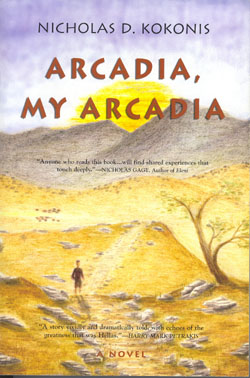"Recording Life Like Willa Cather"-"Well credentialed readers and professional writers alike have found Arcadia, My Arcadia appealing for a variety of reasons, many of them quickly recognizable. Nicholas Kokonis' evocative but precise descriptive powers, the gracefulness of his language, the depth and authenticity of his knowledge of ancient and modern Greece, his warm but sober embrace of its people, legends, religions, and character-all this is abundantly apparent within the first hour of reading. The deepest rewards of the book, though, take shape only in reflection, as one begins to trace the larger contours that emerge in a text that has been sculpted with a skilled hand.
Kokonis' ability to record life-to find the remarkable in the ordinary and the spontaneous while maintaining a firm sense of structure-is impressive, and to this reviewer reminiscent of Willa Cather. Like Cather too, Kokonis is canny in discovering and shaping symbols that seem to emerge naturally from skillfully presented realistic details.
The novel has continued to percolate in my mind since my first acquaintance with it. It easily enters part of an ongoing dialogue with classic initiation works such as Catcher in the Rye; and, given Angelo's early, deliberate commitment to the cultivation of arête, or moral excellence, his dogged sense of self-discipline, and his dedication to the written word as a primary agent of freedom and usefulness, it serves as a stimulating companion text to books like Benjamin Franklin's Autobiography and Richard Wright's powerful self-portrait, Black Boy.
Ultimately, Kokonis' worth as a writer lies in the way he sees. Poet and translator Richard Wilbur, in a brief lyric simply called "Objects," praises the Dutch painter Pieter de Hooch for his "devout intransitive eye." That phrase comes close to defining the quality of Kokonis' vision. "Intransitive" does not mean either disinterested or passive. It is a moral, but not primarily judgmental, way of seeing. It eschews pity but does empathize, and doing so, it humanizes both good and all but the most frightening forms of evil. Ultimately, it may not be the vision without which we perish, but its lack guarantees our own, and countless others', impoverishment." -William Graddy, Ph.D., Professor of English, Trinity University
"What could one first admire in this book?" -"What could one first admire in this book? We owe gratitude to the author because he took the common life of our country and its scenes and made them a blessing through the literary process and projected them on the international horizon for all the world to view and admire." -Photis Fourndavlos, Philologist, University of Athens
"Writing reminiscent of the classic authors." -"Arcadia, My Arcadia is a marvelous book, one that keeps the reader thoroughly entranced from the first page. Nicholas Kokonis has the unusual and unique ability to reveal a human soul's elation and torture, the conflict between hope and despair. His writing, reminiscent of the classic authors, has an ability to touch our hearts with an endearing story that will long be remembered after the last page is read. Arcadia, My Arcadia is a novel that should be on everyone's reading list, and I highly recommend it for teenagers who would certainly identify with Angelos' struggles." -Linda Morelli, Award-winning author of Fiery Surrender and Shadow of Doubt.
"Reminds me a lot of a Greek Steinbeck." - "Arcadia, My Arcadia has a strong, haunting, literary quality.Reminds me a lot of a Greek Steinbeck.Brilliant!" -Betty St. John, Jack Scagnetti Literary Division
"Capturing the soul of a country, as well as your own." -"In today's world of the Internet and cell phones, we rarely see a book that tells a simple story of life and the struggles we undergo to achieve something more for ourselves. The public screams for scandal and exposés, undercover reporting and gossip. The typical coming-of-age story is one of teenagers discovering sex and drugs, without any real substance but merely fluff to feed the masses. Bucking this humdrum, run-of -the-mill formula, Arcadia, My Arcadia, by Nicholas D. Kokonis is the simple tale of a poor boy, working in a ravaged country, attempting to achieve what no one in his village has ever accomplished: to complete high school.
Set on the rich countryside of Arcadia, which one can compare to Thomas Hardy's "Egdon Heath," Kokonis has crafted a wonderful and enjoyable tale, full of the longing of the soul for something more and the simple struggle to survive from day to day in a world full of cruelty and hardship. Using lovely imagery, Kokonis places you in his world without your feet ever leaving the ground, and calling you back to a place you have never visited.
Overall, Arcadia, My Arcadia is a wonderful and beautiful story, without any pretensions or falsehoods, but carrying you into a world very different from your own on the winds of Greece, and capturing the soul of a country, as well as your own, in the process." -Sarah McKeever, Bennington Banner
"The Greek immigrant's odyssey." - "Through this work we have the opportunity to understand the making and the soul of the Greek immigrant who carries within himself /herself the entire Greece. It is a document of life of the ordinary people of the countryside." -Constantine Kousiouris, Philologist
"A must-read." - "Quite honestly, I could not put it down. So well-written and compelling. A must read."-Mary Papoutsy, HCS
Arcadia, My Arcadia can be purchased for $25, plus $4 shipping and handling, from St. Basil's Publishers, P. O. Box, 1155, Deerfield, IL 60015.


